Charity support: City Harvest London – Covid-19 Crisis update
While new COVID infections in London for the moment have declined, the after-effects of the earlier surge will be longstanding. Even as the medical crisis subsides, hunger is just beginning. The economic fallout from this crisis is already severe, and the ongoing social distancing imperative will limit economic activity for a long time to come.
City Harvest’s vision is for London to be a sustainable city, where all people have access to fresh, nourishing food and no unused food is wasted. But for now, even after 6 years of operation, City Harvest is still at the beginning of supporting this city’s most vulnerable. Our neighbours are now lining up for food aid in ways that are reminiscent of Victorian times. In response, City Harvest has more than doubled the number of meals which we deliver and is setting in place the infrastructure to operate at or above this elevated level in the future.
THE DUNKIRK SPIRIT
At City Harvest there has been a Dunkirk spirit since the crisis began, a pride in meeting unprecedented challenges and a swelling sense of community spirit as hundreds of volunteers (students, corporate leaders, teachers, restaurant workers etc) joined us in our work. We’ve provided emergency response efforts in communities where government response was inadequate in both scale and speed, working day and night to fill the gap.
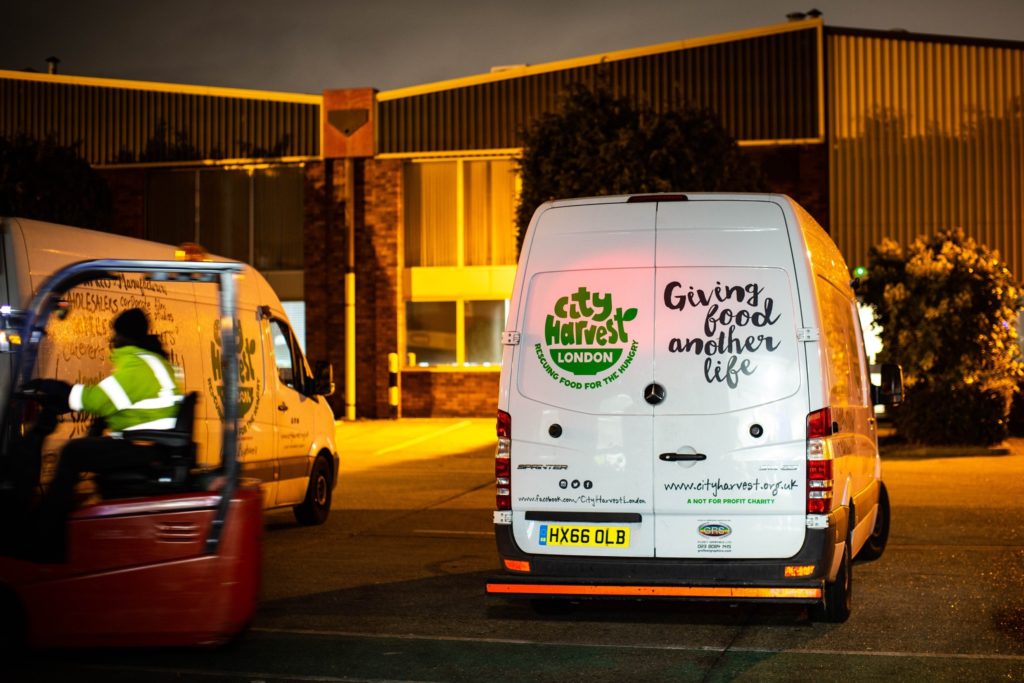
WHAT WE’VE ACHIEVED
City Harvest was already on a very high growth trajectory prior to the crisis but the quantities we’ve distributed in the community reflect a significant step change. We have delivered 10 million meals since we launched. And quite staggeringly, 1.5 million meals have been delivered since lockdown began on March 23. In the week ending March 24th, City Harvest delivered food for more than 210,000 people. During the same period last year, 70,000 meals were distributed – an increase of 200%.
PROOF WE ARE ONE OF LONDON’S CRITICAL EMERGENCY SERVICES
Long before the COVID Crisis City Harvest considered ourselves London’s emergency response unit for surplus food. Our vans have become iconic symbols of hope for the hungry. We now know our service is truly saving lives. There are people to whom our food is delivered who have not had food in their household for 3 days. Our work is now about so much more than food – It is a lifeline.
THE INVISIBLE ARE NOW BECOMING VISIBLE
Those facing hunger before this crisis were often invisible to others in this city, dressed no differently, working at jobs during the day, but at home they might have sacrificed a meal so others in their families could eat. Their jobs were low paying and they weren’t able to afford food after paying rent and utility bills, Others may have had mental illness, preventing them from holding a paying job, or were fleeing domestic violence or war-torn countries with few resources for support.
But the COVID-19 crisis has suddenly caused the hidden hungry to become visible. The City is waking up to this crisis which can no longer be ignored.
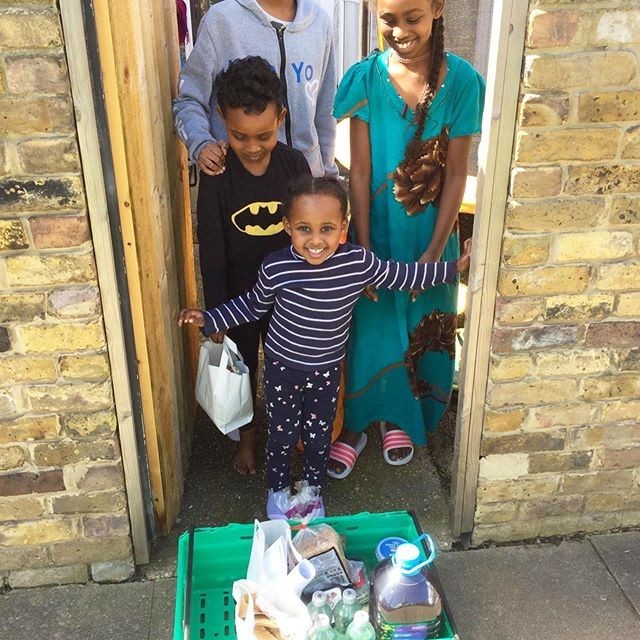
CITY HARVEST FOOD DELIVERIES ARE NEEDED MORE THAN EVER BY PARTNERS
The majority of community organisations to which we deliver food are experiencing funding constraints just as this crisis creates higher demand than ever for their services. In many cases, more than triple the amount of people than their pre-COVID numbers are requesting meals. As the lockdown unwinds and council funded, borough emergency food hubs dismantle, an even greater burden will land on these community partners.
Given that City Harvest delivers annually to each of our community partners food donations valued at £20,000, one can see the tremendous impact we make for each. Their food budget savings can be diverted to other essential services.
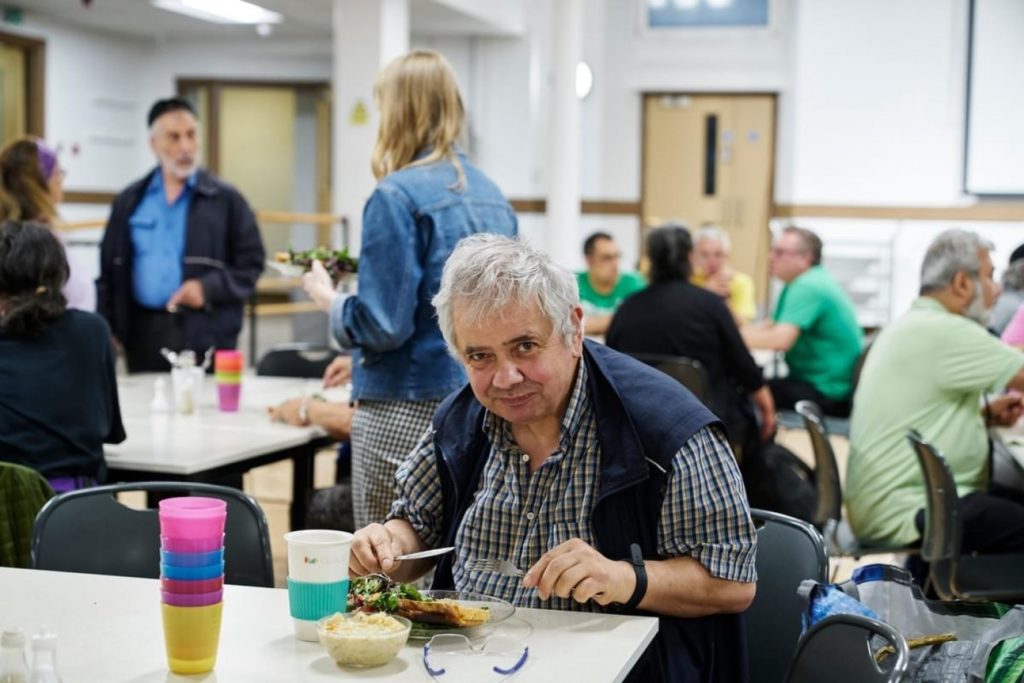
A DESPERATE NEED FOR SOCIAL INTERACTION
The team at City Harvest continue to survey our local partners for deeper insight into the ramifications of this crisis. What we
are hearing is that many of the thousands of people City Harvest nourishes are more alone than ever and eager to return to face to face interactions, and a warm meal among friends.
Pre-Covid, many of the vulnerable people we served had days go by with no social interaction other than a visit to a soup kitchen or community meal. Most of our charity partners have transitioned from community meals to takeaway service or home deliveries, and the brief hello when handed a parcel or when food is
dropped on a doorstep does not fill the void. While many readers of this update are currently experiencing isolation, it is often with families and ample food. Long term isolation and empty cupboards are the norm for thousands of people in London.
Visits by many vulnerable people to any of our 300 charity partners were often the highlights of their days, their only time to be noticed. One event which left a big impression on us this year was a visit to Choir With No Name, a musical respite for homeless and marginalised people which benefits from City Harvest food. At the meal
after rehearsal, all 80 choir members sang “happy birthday” to the relevant people in the room, probably their only acknowledgement. After the meal, the choir members went back to their various shelters or, sadly, to the street.
Food is a tool used by our partners to entice people in for various reasons such as relief of social isolation, nutrition and cookery classes, showers & personal hygiene, counselling and giving people the skills to lead healthier, happier more connected lives. A return to face to face interactions is more important than ever.
Once lockdown eases further, pre-existing social issues will be magnified, and our partners will need to offer more support than ever to more people. The COVID-19 pandemic is disproportionately affecting those at the base of the economic pyramid, in terms of Coronavirus-related deaths and job losses. It will increase the needs of young people out of work succumbing to social pressures, children not getting school meals and going hungry, rising mental health issues, unemployment, and domestic abuse. There will be many long-lasting effects felt from this pandemic that will hit those already living in difficult situations.
“We are delighted to be working with City Harvest to support children at risk of hunger during this crisis. This pandemic has brought food insecurity into the spotlight, but for many families, this continues to be a daily reality – and one that will only get worse as time goes on. That’s why our holiday provision programme, Kitchen Social, is now working with local community groups all over London to deliver hot meals, packed lunches and activity packs to families, especially those who do not qualify for the government food vouchers scheme. With City Harvest’s support, we have been able to provide food for even more children who urgently need our help. Thank you to everyone who has made this possible.” Clara Widdison, Head of Social Inclusion, Mayor’s Fund for London.
“City Harvest has been a fantastic supporter of our project. They have gone out of their way to ensure that we have supplies. Not only have they had to be on the frontline with us to ensure people have basic nutrition, they have had to deal with a huge number of ‘new’ projects such as ours and the steep learning curve we have each had to navigate. We couldn’t do this without them. We owe them a great debt of gratitude Although it felt like it at the very beginning – we are not alone .Thank you for being there City Harvest and for your unstinting encouragement. You mean the world to us and our community.” Melanie – Founder of North Kensington Community Kitchen founded at the beginning of lockdown at a local church kitchen to facilitate local emergency response.
“The City Harvest delivery days are the highlight of my week, my mind starts going crazy with ideas as soon as I see the goods come off the truck!. People are more desperate now than we’ve ever seen them. With all of the closures, our numbers have increased with so many new faces. We’ve seen the extremely young (18-21) and many pension aged guests. We’ve seen people come in who obviously haven’t been sleeping rough very long and some who look like they’re right on the cusp of homelessness. We had 161 people in for a hot meal recently, which was a new record for us, unfortunately, but we fed them all, one by one. Typically, a worst-case scenario for people is that they have to get a free sandwich at the end of the day or go through bins in the back of a restaurant for food that’s been discarded. That’s not even an option now as everywhere has closed.” Chef Lauren Everet, at The Soup Kitchen London, Founded in 1986 as a resource for the homeless, elderly, lonely and poor in Central London, providing free hot meals, clothes and toiletries.
COLLABORATION, PARTNERSHIPS AND MORE: LONDON FEEDING LONDON
What drives the continued enthusiasm of the City Harvest team, is all the engagement from businesses and the community to help feed those who been affected adversely from this crisis. Many top chefs and hospitality workers have come together for projects around London to produce thousands of meals for those who are struggling to access food during this Coronavirus lockdown.
Wimbledon
This is the time of year when City Harvest would normally collect wonderful surplus food from Wimbledon. Instead we will redistribute thousands of meals being prepared by their chefs for the community.
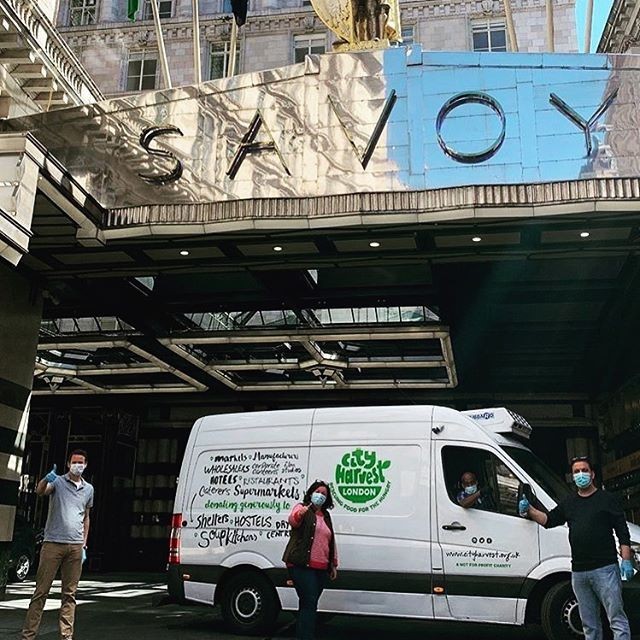
The Savoy
In May City Harvest began working with the Savoy to provide more than 400 meals each week to vulnerable communities in London, which City Harvest will distribute to those facing food poverty. Meals will be produced in The Savoy’s historic kitchens with ingredients donated by the hotel. Although most of the hotel’s team are keeping safe at home, the hotel still wanted to play its part in relief efforts.
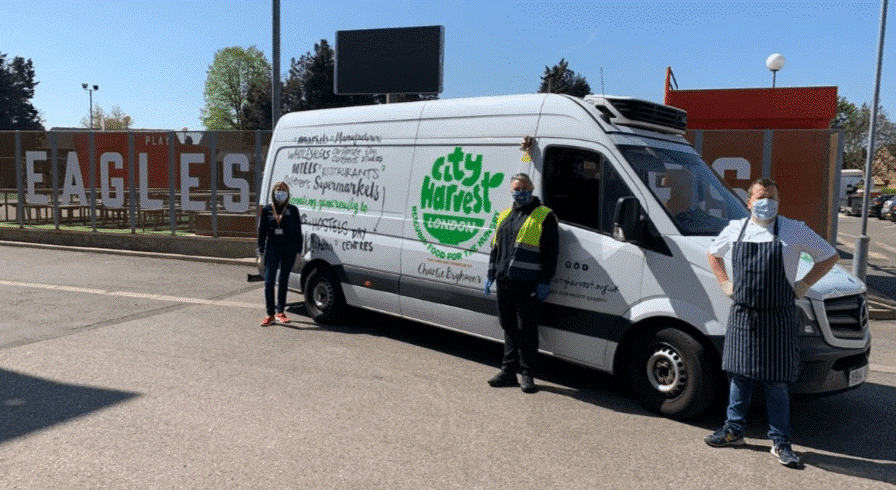
Crystal Palace
The Palace Kitchen, a new initiative between Crystal Palace FC, Palace for Life Foundation and City Harvest London is preparing 1,500 nutritious meals each week, to be delivered by City Harvest to those in their South London community who might be struggling to access healthy food. The programme is being funded by the club and individual shareholders, covering all costs of purchasing fresh ingredients, preparing nutritious meals and safely packing and labelling them ready for collection and distribution.
City Harvest London will be delivering the food packages to the following groups:
• Frontline workers. NHS doctors, nurses and other staff are working relentlessly to save lives in this pandemic to eat whilst on breaks or when home after long shifts.
• Elderly and vulnerable people forced to stay at home. Meals will be delivered to new and existing emergency aid organisations in the area to distribute accordingly.
• Families facing food poverty. Meals are distributed to various local charities who will put food on the tables of hard-pressed families who need it most.
• Homeless people. Many rough sleepers have been put in hotels and hostels around London, with no cooking or food storage facilities. City Harvest distributes the club’s meals to partners running temporary hostels to ensure guests have regular meals.
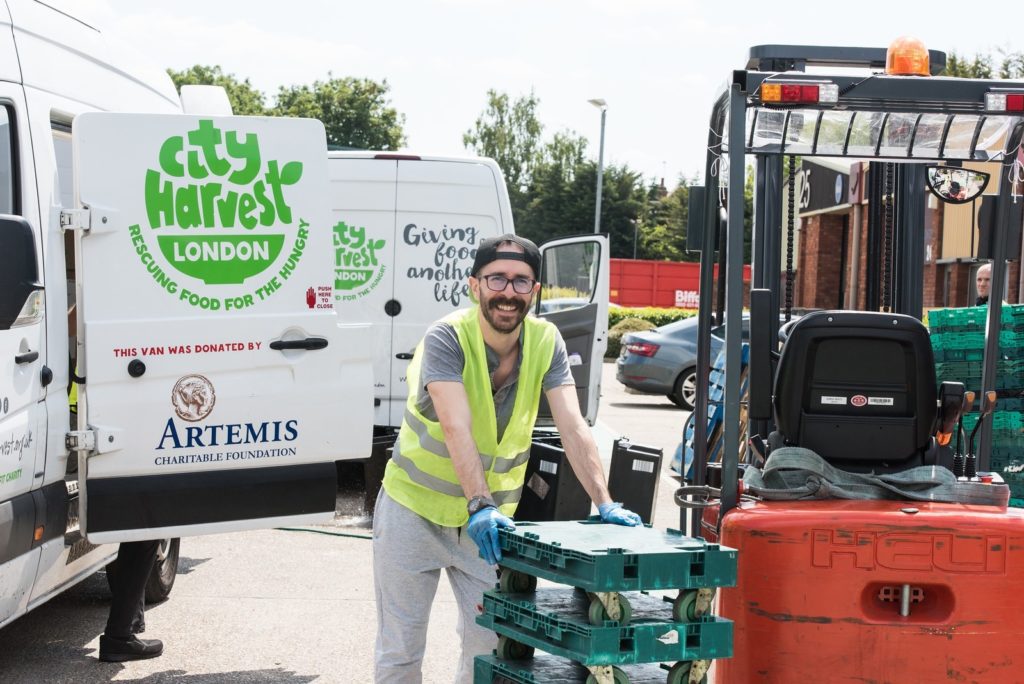
EFFICIENTLY MANAGED TO MEET GROWING DEMAND
Prior to the COVID-19 crisis, demand for our deliveries was already surging. We deliver to 300 charities facing skyrocketing demand. We had 190 charities requesting surplus food deliveries on our waitlist. This has grown to a waitlist of 280. We were at capacity in our depot and had factored in growth to meet this need. This crisis has caused us to more rapidly implement our growth plans and plan for greater need.
We have now secured warehouse space triple our current size and pending manufacturers reopening, we will secure refrigeration and freezer units to outfit this new space to create an efficiently managed warehouse with capacity to safely handle large volumes of fresh, perishable food for more than 20,000 people each day. There will be more vans, drivers and members of the logistics team.
The year ahead will be one of investment to meet this need. We, as always, will aim to keep costs at a minimum and where possible, source donations of equipment and vans. City Harvest is a registered charity run like a business to achieve our goals. In times of investment, such as when we secured our first depot and grew our management team, our costs will increase. We see other factors coming into play as well. While food supplies have recently been greater than normal, we don’t yet have clarity in the short term about changes resulting from closed borders across Europe, Africa and America. Migration of farm workers to plant and harvest produce is impeded, and Brexit compounds these circumstances for the UK in particular. Therefore, City Harvest might have to work harder, travel farther, and think more creatively to source food to fulfil our mission. We’ve operated efficiently to date, rescuing food at £.25 per meal, and we will work extremely hard to manage growth efficiently.
Our goal is to grow to rescue 16 million meals annually and deliver to more than 1,000 charities
CITY HARVEST: A CONDUIT TO THE COMMUNITY
We are now approaching an inflection point in the crisis when both individuals and companies are reassessing values and priorities.
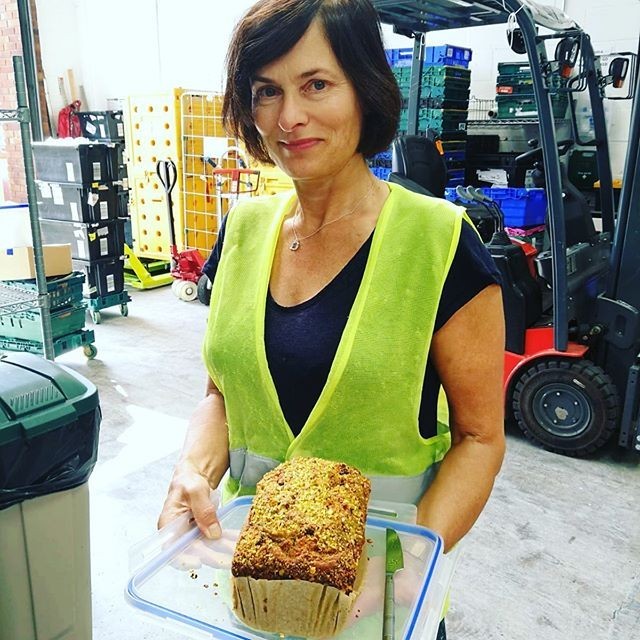
CAN I BE MORE PURPOSEFUL?
This impact and lockdown are giving each of us a more local focus and time for reflection. With
travel restrictions and social distancing measures in place we’re purchasing our food more locally than before, observing more details around us, and looking more closely at neighbours who might need help. Many people have been eager to support those working incredibly hard on the frontlines to keep society going during this crisis. We have many of these individuals volunteering at City Harvest, witnessing our daily impact and several have begun to re-evaluate the nature of their work. Longer-term, we believe there will be more people seeking a sense of clear “purpose” in their work and a commitment to individual volunteering and philanthropy. This in turn, may induce a change in corporate cultures from the bottom up.
THE IMPORTANCE OF LOCAL IMPACT
The current COVID-19 crisis is a reminder that we each benefit from supporting and strengthening the wellbeing and resilience of our local communities. Philanthropists, private foundations, corporations, and individual donors alike are often drawn to worldwide problems, leading them to direct capital to address issues thousands of miles away. While these contributions are critical, the pandemic has drawn attention to the dire need in their own backyards, producing a greater interest in local giving.
LONG-LASTING CORPORATE SUPPORT FOR THE LOCAL COMMUNITY
Businesses and investors are re-evaluating the economic, environmental, social and governance factors to adjust to the new normal. The S in ESG is getting more attention as a result of the pandemic. Companies in the months and years ahead will be judged by their ability to manage the economic ramifications of the COVID 19 crisis as well as how they’ve supported their employees, clients and communities.
We believe there has been a genuine shift towards community support that will be long-lasting, as companies address the most pressing challenges brought about directly and indirectly by the virus in the communities where companies are based and where employees live. The spiralling rate of poverty and hunger is more relevant than ever, and employees are eager to genuinely engage with something that truly matters. We believe that this will continue post-pandemic.
City Harvest has provided our supporters with a conduit to hundreds of other charities across London communities. We understand the complexities of each unique community and speak to community leaders and local groups who know the area its culture and faiths intimately. City Harvest identifies charities that are truly local, doing the most vital work to strengthen local communities. Having these relationships enabled us to react rapidly and effectively in this crisis.
SUSTAINABILITY
Coronavirus may have brought our daily lives to a halt, and carbon emissions in major cities have declined, but the climate continues to change. Whilst most of us have been under lockdown, environmental researchers have released new findings to further support the trend of global warming. Although we are all pleased that in some cities carbon emissions have dropped by 17%, quarantining the world is obviously not a long-term solution to climate change.
Minimising food waste, one of the greatest contributors to climate change, is a viable solution and we are hopeful that this pandemic will lead to change. It suddenly seems possible that people can be convinced to behave differently for the greater good, as we’ve seen entire populations of cities self-isolating to prevent the spread of disease. The emergence of the COVID crisis might also result in a more widespread belief that climate change can actually happen and ultimately bring the world as we know it to a halt. It’s highlighted the issue of “known unknowns” – known possibilities that lie quietly in the background, for which we haven’t sufficiently planned, such as climate change.
Among businesses, there is new theme of “building back better” and believe this crisis will lead to a greater focus on environmental sustainability and a heightened awareness about both food waste and hunger in the local community. Businesses will be increasingly influenced by socially conscious employees and consumers who believe it to be a social imperative to donate food rather than wasting it. In this new environment, City Harvest is expanding our outreach efforts to food businesses in order to increase surplus food donations.
LONGER TERM ENDURING IMPLICATIONS OF THE CRISIS
We believe there will be many positive longer-term enduring implications of the crisis. Children growing up during this crisis may have a greater awareness of the needs of the community. The impact on children of the experience of clapping for for NHS staff and other key workers may affect their views of what is important in society. Witnessing parents delivering food to neighbours and volunteering might lead to a stronger sense of giving. This social consciousness will all benefit City Harvest and its peers in the voluntary sector.
CITY HARVEST: REVIEWING OUR RESPONSE AND PREPARING NOW FOR THE NEXT CRISIS
City Harvest aims to survive and thrive in the face of unpredictable challenges and the COVID Crisis has tested us. But we know this is not a one-off challenge. We are reflecting on our response to this rapidly evolving situation and consider this a valuable learning opportunity. Working with Bain & Co, which has offered pro bono services, we’re examining our responses and distilling lessons. We are preparing for the next crisis, or the next phase of this current crisis.
SOME OF OUR LEARNINGS:
• It’s important to have a clear set of principles in place for how we approach our response. Early on in the crisis we committed to support all our existing community partners which remained open and, should our food supplies permit, support new borough emergency hubs and voluntary organisations which originated throughout London to feed NHS workers and other frontline workers, as well as isolated and vulnerable individuals in their homes.
• We rapidly communicated with employees, charity partners and food donors. We are now developing systems to make this process immensely simpler.
• We have always put a premium on flexibility, but we have shown during this dynamic COVID-19 crisis that we can evaluate what works and rapidly choose the most effective strategy in the short term. A war room set-up empowered a small dedicated team to decide and execute.
• City Harvest were already close to capacity prior to the crisis and had planned to add additional capacity. We were fortunately able to source temporary warehouse space but, in the future, we need to have extra capacity available to deal with surges.
• Relationships are key and so many existing food donors were vital to our relief efforts. Going forward we need to bring in more food donors, from diverse parts of the supply chain to create flexibility and resilience in crisis situations.
• Relationships with our financial supporters, who had a deep understanding of and appreciation for City Harvest prior to the crisis, were instrumental in facilitating rapid support for our relief efforts.
THE DAYS AHEAD
We believe we have entered the new normal, and City Harvest is adjusting to the significant step change it made in the last 8 weeks. We will serve our partners as they re-open, support any partners that face surges on demand, and closely monitor and adapt to the need in each local area.
It is with immense gratitude that I thank the many corporate partners, trusts and foundations, and individuals who immeasurably supported City Harvest during this crisis.
We could not have delivered over 1 million meals without your genuine interest in our work and immediate response to the resources we would need to respond.
We hope that with fewer lives lost in London with each passing day, we can all soon return to our pre- COVID lives, albeit with social distancing still in place, combined with a greater sense of community and heightened regard for those around us.
Laura Winningham CEO, City Harvest May 29, 2020
From our previous updates:
City Harvest Update 1 (March 30) The Coronavirus Crisis now a Hunger Crisis As the crisis gripped London, City Harvest worked with leaders in City Hall, local boroughs and local communities to rapidly asses and respond to need, forming the London Food Alliance and scaling up almost overnight. We provided a sustainable solution for more than 100 tons of surplus food from restaurants and the hospitality industry that would otherwise go to waste.
We sourced temporary infrastructure to accept the supply and the City Harvest team was bolstered by an outpouring of support from the community.
City Harvest Update 2 COVID: Hunger the Lasting Legacy
One month in, it was becoming clear that we were responding, with our unique community knowledge, to a humanitarian aid crisis in London for which there was a lack of emergency preparedness. Our work took on even greater importance as our meals were now often providing life-saving nourishment to isolated and overlooked people in the community.
Research showed that 1.5 million people in Britain were going a whole day without food on any given day, due to having no money or access to food


